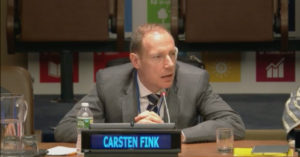A report by Soroptimist International Director of Advocacy, Bev Bucur – A snapshot from ‘Advancing science, technology and innovation for SDGs’
“An objective of this session was to explore policies and actions for advancing science, technology and innovation in order to achieve the Sustainable Development Goals (SDGs), as envisaged in the 2030 Agenda for Sustainable Development.
The Agenda launched a UN Technology Facilitation Mechanism (TFM), which was made up of a United Nations Interagency Task Team on Science, Technology and Innovation for the SDGs (IATT), a collaborative Multi-stakeholder Forum on Science, Technology and Innovation for the SDGs (STI Forum), and an online platform as a gateway for information on existing STI initiatives, mechanisms and programmes.
The co-Chairs of the STI Forum H.E. Mr. Toshiya Hoshino and H.E. Mr. Juan Sandoval Mendiolea presented the mandated Summary of the Multi-stakeholder Forum on Science, Technology and Innovation for the SDGs, the theme of which in 2018 was ‘Science, Technology and Innovation for sustainable and resilient societies – Focusing on SDG 6, (Clean Water and Sanitation) SDG 7 (Affordable and Clean Energy), SDG 11 (Sustainable Cities and Communities), SDG 12 (Responsible Consumption and Production), and SDG 15 (Life on Land). This was followed by discussions by the TFM 10-Member Group of high-level representatives.
The Session was Chaired by E. Ms. Inga Rhonda King, Vice-President of ECOSOC.
H.E. Mr. Toshiya Hoshino, Ambassador and Deputy Permanent Representative of Japan to the UN, Co-Chair of the Multi-stakeholder Forum on Science, Technology and Innovation (STI) for the Sustainable Development Goals
Introducing results of the STI Forum in June 2018 and takeaway messages, Mr. Toshiya Hoshino reflected on the Forum, viewing it as a starting point for action on the STI SDG roadmaps, with increased expectation for the Forum next year.
 H.E. Mr. Juan Sandoval Mendiolea, Ambassador and Deputy Permanent Representative of Mexico to the UN, Co-Chair of the Multi-stakeholder Forum on Science, Technology and Innovation (STI) for the Sustainable Development Goals
H.E. Mr. Juan Sandoval Mendiolea, Ambassador and Deputy Permanent Representative of Mexico to the UN, Co-Chair of the Multi-stakeholder Forum on Science, Technology and Innovation (STI) for the Sustainable Development Goals
Mr. Juan Sandoval Mendiolea said the Forum addressed cross-cutting issues and global trends: opportunities and challenges; needs and gaps and the highlighted the impact of the rapid technological change, on the achievement of the SDGs. Deeming this issue of paramount importance, particularly in relation to achieving the 169 targets enshrined in the SDGs, he underlined the exponential pace of changes in technology, additionally discussing reports submitted during the Forum, such as the report by the Commission and Science Technology for Development (CSTD), Geneva, (a subsidiary body of the Economic and Social Council (ECOSOC), which looked at robotics, artificial intelligence, biotechnology and nano technology, and stressed the far-reaching impacts they present for the economy, the environment and society.
He accentuated a forward-looking perspective, and the importance of education in science and technology, in addition to better use of data, and an exploration of opportunities for partnerships with those at the forefront of STI change, such as Universities and public/private partnerships.
Linking water access, and sanitation and hygiene to science, technology and information, he promoted the use of technology in monitoring water consumption, and additionally for local capacity building for renewable energy, particularly in rural areas, and for monitoring climate change. Notably, goals linked to TFM showed some attention to women and girls.
Panellists:
 Ms. Endah Murniningtyas, Co-Chair of the group of scientists for the Global Sustainable Development Report, Indonesia
Ms. Endah Murniningtyas, Co-Chair of the group of scientists for the Global Sustainable Development Report, Indonesia
Ms. Endah Murniningtyas explored the role of science in data development and the importance of SDG implementation. Her presentation discussed the interdisciplinary science approach needed to reach the SDGs in the next 12 years; the interlinkages between the SDGs, and trade-offs to avoid. She placed importance on improving the science link to poverty, education and predicted that science could do more at country level, underlining power analysis and stakeholder evaluations. Ms. Murniningtyas discussed improving knowledge of science and policy within the local indigenous community, and improving communication channels with stakeholders, so that findings might be translated into policies. She questioned how STI can be mobilised to improve the lives of those left behind, and discussed the use of IT in Indonesia in the collection of real data regarding the perception of situations, to improve understanding of how people and communities deal with shocks.
 Mr. Carsten Fink, Chief Economist, World Intellectual Property Organization (WIPO)
Mr. Carsten Fink, Chief Economist, World Intellectual Property Organization (WIPO)
Mr. Carsten Fink introduced the Global Innovation Index which was launched on this day and provides detailed metrics about the innovation performance of 126 countries and economies around the world. Its 80 indicators explore a broad vision of innovation, including political environment, education, infrastructure and business sophistication. It also looks at how breakthrough innovation occurs, ‘innovation hotspots’ at the grassroots level and describes how small-scale renewable systems are on the rise and how this can be used as a tool for policy makers, and as a ranking innovation framework. He spoke of “Energising the world with innovation” – such as a dramatic reduction in cost of renewable energy, E.G. An 80% reduction in the cost of solar panels in ten years.
Lead discussant:
 Mr. Ernest Foli, Forestry Research Institute of Ghana introduced the African Consultation report for the SDGs. Key messages from the consultation included:
Mr. Ernest Foli, Forestry Research Institute of Ghana introduced the African Consultation report for the SDGs. Key messages from the consultation included:
- Africa’s transformation will come from within, nothing about us without us, steer own transformation by reducing international depndency and leapfrog with new technology, particulalry for agriculture.
- Supporting African STI is key and must mobilise African resources that can translate into technology and innovation including indigenous knowledge – this will push forward health solutions.
- Food Security is not limited to agricultural poroduction. HIV has devastated households and hurt the sole breadwinners, directly relating to hunger.
- Africa needs growing investment in health and education infrastructure – governments must commit specific proportions of their budgets to these sectors, which will also create jobs.
- Job creation must match populations growth – there are limited opportunities for youth. Private secotre has opportunity to create jobs.
- Planning tools shou8ld be used to respond to and prevent epidemics – innovative models like ‘one health model’.
Further information at: https://sustainabledevelopment.un.org/hlpf/2018
Programme at: https://sustainabledevelopment.un.org/hlpf/2018#programme
Voluntary National Reviews at: https://sustainabledevelopment.un.org/vnrs/
Catch up with all the SI blogs from the High-Level Political Forum Read More

